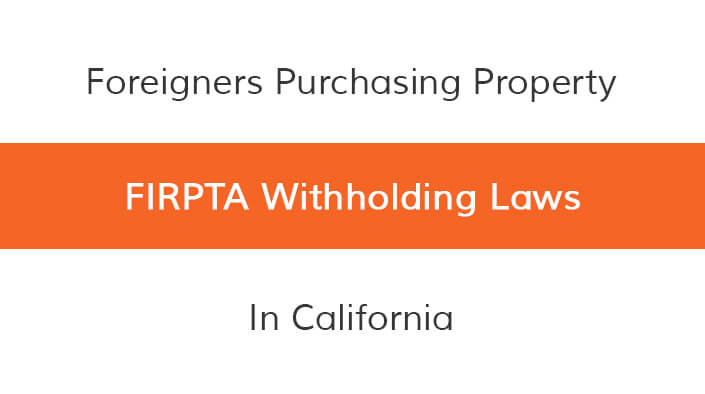FIRPTA Withholding in California – Federal regulations under IRC Code section 1445 (FIRPTA)
Are you an individual who is looking to buy a property in the U.S. but you are a foreigner?
There are no restrictions for you to buy, but when it comes time to sell, you will need to plan in advance because the U.S. government has some laws that will apply to you.
Knowing about the laws and planning in advance will save you much time, effort and headaches when the time comes.
This article is written as an educational tool for other Escrow Officers (Settlement Agents) and for Real Estate Agents, but as a Foreign Investor, it is definitely to your advantage to see what you need to know.
The Federal regulations for the Foreign Investment in Real Property Act (FIRPTA) was put in place in 1980, but in the recent decade, the influx of foreign money has really brought a lot of attention to it.
I have gotten many phone calls asking for tips on what to watch for when foreign nationals invest in real estate here in the U.S. It is safe to say that our economy loves the investment, but there are certain basic facts that we, as Settlement Agents, have to learn to expect and require from foreigners.
This article will give an idea of general concerns; more complicated issues and legal aspects should, of course, be referred to your legal and financial counsel.
First off, there would be no sale, of course, if there wasn’t the initial purchase of the real estate. The critical issues come when they sell their investment but it really all starts when they buy.
PURCHASE – The U.S. welcomes the investment of foreign money, whether it is for real estate or other goods and services. A foreigner does not have to have a green card, permanent residence status or a Tax Identification Number (ITIN) in order to make the investment.
The foreign Buyer deposits the funds in escrow and that is that. We happily take the money in and there would be no special additional paperwork that we would require from this foreign Buyer. Furthermore, we do not report the funds or its source to the IRS.
Reminder: Whether the Buyer is a foreigner or not, it is important that they seek out their own legal and financial counsel on their federal and state tax liabilities and responsibilities before and after their investment is made.
For a foreigner, although no ITIN is required at the time or purchase, we strongly recommend that they check with a U.S. accountant whether they should apply for an ITIN number after the purchase is made, as the filing of income tax returns for their investment properties may be required at the year end.
SALE – This is where the confusion and questions come in for the foreign Seller.
1. In order to complete the sale of the real property, every Seller, foreign or not, is required to complete and sign, under penalty of perjury (perjury – willfully making a false statement), the Foreign Investment in Real Property Act (FIRPTA) form.
This form states that the Seller is not a “nonresident alien”, ie, a foreign person. The foreign Seller cannot sign this form, even if they already have a ITIN number, and must return it unsigned, which then becomes notification to the parties and the Settlement Agent that he is a foreigner.
Settlement Agents: Watch for incorrectly completed FIRPTAs. An ITIN number starting with a “9” IS NOT a Social Security Number issued to a permanent resident or U.S. national, but is probably given to a foreigner.
On the other hand, some foreigners have an ITIN that looks like a regular Social Security Number, which they may have received when they were students, but in actuality, the person is a foreigner.
As a Settlement Agent you cannot police this; if this Seller completes the FIRPTA form (under penalty of perjury) and hands it to the Settlement Agent, then the Settlement Agent accepts it “as is” for the file.
2. Buyers in the transaction need to be aware that the IRS designates the Buyer as the Withholding Agent and therefore it is the Buyer’s responsibility to do the withholding and send the amount to the IRS.
As a matter of course the Buyer will then instruct the Settlement Agent to do this withholding as we are more familiar with the process, but Buyers must be aware that that if the FIRPTA withholding is not done, or not done correctly, the Buyer may become liable for the tax and penalties.
This is a good reason why Buyers and Sellers must be sure that they are using a Settlement Agent who is knowledgeable and experienced in this law and who knows what needs to be done, what to expect, and what are possible solutions.
3. One of the most important things about this whole process is that the foreign Seller needs to have their Individual Tax Identification Number (ITIN) in order to properly do the withholding.
If the Seller doesn’t have one, it can be obtained by submitting form W-7 to the IRS (see instructions). This ITIN number is required by the time we close escrow and as it takes 6–8 weeks to process, immediate attention is required.
This is why I mentioned that it is a good idea for the Seller to try to obtain this ITIN when he became the owner of the property after the initial purchase was made.
Recommendation: The Seller should go to an accountant who is well versed in this area to apply for the ITIN.
New regulations for the application of the ITIN requires the foreign applicant to submit their original passport with the application, or they must get a “Certified” copy of it. A “Certified” copy can only be obtained from special Certified Acceptance Agents at the IRS or elsewhere, and not all IRS locations have such a person.
4. Another issue of concern relates to married couples:
Are the Sellers a married couple but one of them is a foreigner?
The IRS will look at the married couple as two different individuals. That means that although the withholding will not be required for the non-foreigner, it will be required on the foreign spouse. All the rules stated here will then apply to this spouse.
5. The new FIRPTA regulations that became effective on February 17, 2016 has increased the withholding amount and now there is a maximum amount of up to 15% of the Sales Price (see #7 below for calculations) that needs to be deducted from the Seller proceeds and sent to the IRS.
Please note: The amount to be withheld is based on the Sales Price, NOT the net proceeds, NOT the profit, and NOT the gain.
The amount has to be withheld even if the foreign Seller is claiming a loss or no gain on his investment. If the amounts that are required to be withheld is more than what the Seller’s proceeds will cover, the Seller will need to bring in the difference to be deposited with the Settlement Agent. Beware! This applies to a Short Sale transaction also.
Recommendation: If this is a Short Sale transaction in which the Sale Price is less than what the Seller owes, then the Seller should apply early for their ITIN and the projected withholding amount must be taken into consideration and figured into the Seller’s estimate statement for calculation.
6. How can the requirements to withhold be circumvented?
There are a few ways.
(a) The Buyer is willing and able to sign a Buyer’s Declaration which says that:
(i) the Sales Price is under $300,000,
(ii) the Buyer is an individual person (not a company), and
(iii) the Buyer will use the property as his residence for 50% of the year for the first two years of ownership.
Please note: This Declaration may provide unacceptable risks to the Buyer who is signing this form just to accommodate Seller’s withholding problems. The Buyer is cautioned to get their legal and financial counsel before signing.
If the Buyer is unwilling to sign, then the withholding will be based on the formula showing in item 7.
(b) The foreign Seller can submit to the IRS a request for a reduced withholding by using form 8288-B . The process can take months, so we recommend that it is started early and that an experienced accountant representative is used to help with the submission.
Please note: The IRS will automatically reject an application if Seller does not have an ITIN number on the 8288B form.
(c) The investment is made under a U.S. domestic corporation in which the qualifications under Section 1445 of the Internal Revenue Code are met.
Recommendation: The foreign Seller must consult with his U.S. legal and financial counsel to see if they qualify. Some Sellers may transfer in or out of their corporate ownership to avoid FIRPTA issues. The IRS frowns on this and can put your transaction under audit.
7. The newest changes to the withholding requires the calculation of a formula for the withholding, as follows:
- If the Sales Price is under $300,000 – no withholding is required when a Buyer signs his Declaration (see #6a)
- If the Sales Price is between $300,001 and $1,000,000 – the withholding is 10% of the Sales Price
- If the Sales Price is $1,000,001 and over – the withholding is 15% of the Sales Price
Please note: If the Buyer cannot sign, then the withholding will be at 15%, no matter the Sales Price
8. The Settlement Agent, on behalf of the Buyer, will remit the amount withheld directly to the IRS within 20 days from the day of closing to avoid incurring penalties. The 8288 and the 8288A requires the Buyer’s name, address and ITIN number as they are the “Withholding Agent”.
The foreign Seller’s name, address and ITIN number are also required, of course, and without the Seller’s ITIN it will be difficult for the IRS to credit the correct account when income taxes for the foreign Sellers are filed.
Please note: A late remittance of the withholding will result in a penalty of 25% of the withholding amount and it is charged against the Withholding Agent!
9. Reminder: The foreign Seller will still have the responsibility of declaring the sale of his property/investment on an income tax return to be filed at the end of the fiscal year.
At that time the income tax should include a copy of the 8288A form that the Settlement Agent used to remit the funds. If the funds sent to the IRS are more than what his tax liability is for that year, the IRS will refund the difference to the foreign Seller.
Do you have further questions regarding the FIRPTA law?
Here is the link for a general description of the law.
We hope this article has been of interest to you. It is important that you choose a Settlement Agent who can bring his/her knowledge and experience to your transaction.

Juliana Tu, CSEO, CEO, CBSS, CEI, SASIP
Escrow Manager

Good news! “The Art of Escrow” is out! Look for it on www.amazon.com!

The Art of Escrow:
The Fight For Your American Dream and the Pursuit of Homeownership
Available now at Amazon.com
- Threats to Escrow – Part 5 – Document Fraud! - May 19, 2023
- When the Loan Got Sold and You Just Closed Escrow - April 6, 2020
- Mechanics Lien - October 7, 2019
- Are You a Foreigner and Need to Know About U.S. FIRPTA Withholding Laws? - February 20, 2019
- When the FIRPTA
Withholding Goes Wrong - February 20, 2019
Join Our FREE Viva Escrow Forums

